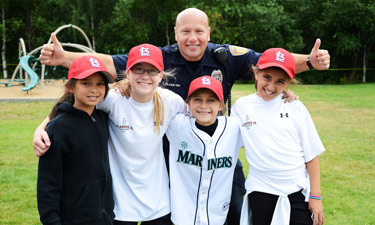 The idea is simple, direct, and efficient: What if police officers engaged with kids and teens not as distant figures of authority, but instead as coaches and mentors? This is the idea at the heart of the Cal Ripken, Sr. Foundation’s Badges for Baseball initiative—and the answer so far is clear. By working directly with at-risk youth, law enforcement officials are able to ease community tensions in high-crime areas and foster a more positive view of police officers. That this is structured around athletics is also key: Badges for Baseball provides a much-needed physical outlet while offering lessons in sportsmanship, teamwork, discipline, and the value of a healthy lifestyle.
The idea is simple, direct, and efficient: What if police officers engaged with kids and teens not as distant figures of authority, but instead as coaches and mentors? This is the idea at the heart of the Cal Ripken, Sr. Foundation’s Badges for Baseball initiative—and the answer so far is clear. By working directly with at-risk youth, law enforcement officials are able to ease community tensions in high-crime areas and foster a more positive view of police officers. That this is structured around athletics is also key: Badges for Baseball provides a much-needed physical outlet while offering lessons in sportsmanship, teamwork, discipline, and the value of a healthy lifestyle.
And the program is making a difference. That is the refrain of the recreation and youth development specialists running the programs in their cities—and it seems to be the general consensus among participating officers. For example, 91 percent of the Badges for Baseball officers who responded to a recent survey saw program participants grow more comfortable with law enforcement, and 80 percent said the youth who participated were living healthier lifestyles in general as a direct result of program involvement.
Badges for Baseball represents a rare combination of national scope and local impact: Since its inception in 2008 as Cal Ripken, Sr. Foundation’s signature program, Badges for Baseball has served thousands of children and teens across many states. After the remarkable success of its pilot programs, Badges for Baseball is now well established in Virginia, Wisconsin, Mississippi, Massachusetts, and North Carolina. Badges for Baseball has also begun working with attorneys general in order to bring the program to disadvantaged teens in Maryland, Connecticut, Kentucky, Florida, Arkansas, and Maine.
The profound impact of Badges for Baseball was also echoed by Yvonne Hollins, who directs the Boys and Girls Club of Central Pennsylvania—and who brought the Badges for Baseball program to the city of Harrisburg. According to Hollins, the program helped address Harrisburg’s urgent problems of a rising youth crime rate and increased teen homicides.
“This partnership was a blessing…A positive rapport coupled with positive experiences with law enforcement impacts every member, staff, family, and our community,” she says. “We do not use the word ‘cop’ or ‘cops’; we show respect by using the words ‘police officer’ and ‘officer.’ Our youth are more comfortable with our law enforcement personnel--this is evident in their involvement and the respect demonstrated at the club, home, school, and the community.” She concludes that “our communities will be safer as we participate in activities such as Badges for Baseball."
Steve Kast, Boys and Girls Club director in Newport News, Virginia, agrees with Hollins—and emphasizes that the reach of the program extends well beyond crime prevention. It is about inspiring and educating young people. “Our youth often live in distressed, crime-ridden communities and otherwise would not have these opportunities,” Kast comments. “The Badges for Baseball Program has been a tool for us to use in our proactive measures against crime, gangs, and negative behavior in our community. This program fits well with our mission ‘to inspire and enable all youth, especially those who need us most, to realize their full potential as productive, caring, and responsible citizens.’”
According to Cal Ripken, Sr. Foundation Director Steve Salem, the key to the program’s success lies in forming strong local partnerships—like that between Badges for Baseball and The Boys and Girls Club of Central Pennsylvania and Newport News: “We knew that if we were going to be successful, we couldn’t go and compete with locally based organizations.” Instead, Badges for Baseball identified an unmet need faced by youths around the country, and then sought out organizations already successfully serving at the local level. Partnerships vary by community, but local Boys and Girls Clubs, afterschool programs, and police activity leagues are all prominent names among the success stories.
Parks and recreation departments also stand to play a vital role in Badges for Baseball’s effort to translate national vision into local reality: the program, Salem explains, “is running mainly through existing local parks and recreation agency facilities. The foundation is also trying now to partner with parks to build synthetic-turf youth development parks in places where kids have nowhere to go that is safe.
Learn more about Badges for Baseball.
Maureen Hannan is Senior Editor of Parks & Recreation.

